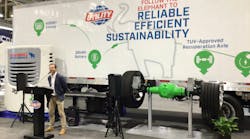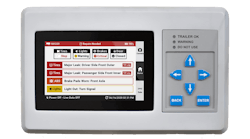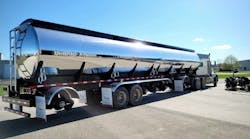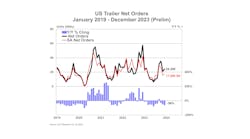The U.S. House of Representatives passed a transportation bill that permits the tandem towing of empty light- and medium-duty trailers from manufacturer to dealer, which—according to the National Association of Trailer Manufacturers (NATM)—is a common-sense reform that will help consumers, lower freight costs, reduce highway congestion and deterioration, and decrease highway-based emissions.
The legislation is now headed to a conference to reconcile the differences between the House and Senate bills, and the NATM, which represents light- and medium-duty trailers manufacturers and suppliers, is asking Congress to include the tandem towing provision in the final bill.
Reps. Rick Crawford (1st-AR), Lynn Jenkins (2nd-KS), Tim Ryan (13th-OH), and Eddie Bernice Johnson (30th-TX) sponsored a bipartisan tandem towing amendment during consideration of H.R. 22, the Surface Transportation Reauthorization and Reform Act of 2015 ("STRR Act") that was unanimously approved. The STRR Act would reauthorize surface transportation programs, including important safety programs, and provides critical funding for the nation's highways. The tandem towing provision included in the bill would permit light- and medium-duty trailer manufacturers to deliver their products from the manufacturing plants to dealers in tandem combinations, subject to existing size and weight restrictions and only when operated by professional drivers holding commercial drivers license (CDL) certifications.
"Current federal requirements force light- and medium-duty trailer manufacturers to transport their empty, finished product to their dealers, oftentimes hundreds of miles away, one at a time, increasing delivery costs, hurting consumers, contributing to highway congestion and deterioration, and harming the environment due to increased emissions," said Pam Trusdale, Executive Director of NATM. "This tandem towing provision provides a safe and effective method to address that situation, making it more efficient for manufacturers to reach their markets, saving consumers money, and taking delivery trucks off the highways."
The light- and medium-duty trailer industry employs more than 225,000 Americans and contributes $3 billion per year to our nation's economy. Hundreds of manufacturers across the country, mostly small businesses, produce various types of trailers such as livestock or utility trailers that are towed by consumers behind pickup trucks. This limited modification will put these trailer manufacturers on equal footing with other vehicle manufacturers and reform burdensome regulations not designed for the transport of light- and medium-duty trailers.
When the House overwhelmingly passed a six-year highway bill following two days of debate on amendments, the final vote was 363 to 64 in favor, meaning the Surface Transportation Reauthorization and Reform Act of 2015 (the STRR Act) will now move to a reconciliation process with the Senate bill passed earlier this summer.
Passage of the bill did not come before there were several additional trucking-related amendments voted on in a second day of debate over the six-year, $325 billion package. Among them, an amendment aimed at giving truckers relief from California’s minimum wage and rest break laws was approved by the House Wednesday evening. A provision to add hundreds of thousands of safe but DOT-unrated trucking companies to a proposed carrier hiring standard was withdrawn, however. And language to undo existing highway bill provisions that remove CSA scores and launch a graduated CDL program for truck drivers under 21 years old both failed.
The California-related amendment by Rep. Jeff Denham (R-CA) prohibits states from imposing labor laws or regulations on companies whose employees are subject to federal Dept. of Transportation hours of service (HOS) rules. Additionally, states may not enact or enforce laws that require a motor carrier that pays employees on a piece-rate basis to pay those employees separate or additional compensation, provided the compensation is equal to or greater than the applicable hourly minimum wage of the state.
The legislation is needed because California courts have repeatedly failed to recognize that the federal preemptions under the Federal Aviation Administration Act (F4A) apply to interstate trucking operations, explained Richard Pianka, lead litigator and acting general counsel for the American Trucking Assns. When the U.S. Supreme Court declined to consider a recent appeal, the industry’s remaining recourse became Congress and legislation.
Specifically, 4FA says that local or state laws cannot interfere with price, routes, or services.
“Meal and rest break requirements at the state level prevent carriers from operating on a nationally uniform basis,” Pianka told Fleet Owner. “You can’t do a six-hour run California. You can under federal rules. So if you’re terminals are located with federal rules in mind, and now you can’t make the same runs, you have to start reconfiguring everything—so that’s a huge impact.”
Likewise, California wage-and-hour enforcement policies and related court decisions have made attempts to use a compliant mileage-based pay plan for truckers exceedingly complicated, to the point of being absurd.
“It prevents motor carriers from using a pay system that’s based on productivity and efficiency,” Pianka said. “And that was exactly why Congress originally preempted states from regulating the trucking industry. It wanted the market to shape industry to make it as productive and efficient as possible.”
He emphasized that the amendment isn’t designed to undercut state minimum wage rates, or that companies only need to pay that hourly rate.
“If you think the California system is just fine, then don’t worry about this,” Pianka said.
California Assembly Bill 1513, signed into law last month, is a labor code update designed to deal with agricultural wage issues but which also severely limits piece-rate compensation for carriers. And, without the Denham amendment, trucking companies large and small can expect the legal aftershocks to continue.
Joe Rajkovacz, director of governmental affairs and communications for the Western States Trucking Assn., points to a $100 million class action lawsuit facing Wal-Mart, a company which offers “the best private sector driving job in the country.” Simply, in California drivers and “shyster lawyers” are being very successful at suing companies because their employees were not paid specifically for activities such as fueling the truck.
“Never mind, when you add it all up, this guy’s getting paid $30 an hour for his time. He wasn’t directly compensated for whatever that bottom-line time was, at least at a minimum wage,” Rajkovacz said. “These geniuses think they’re uplifting drivers by screwing with motor carriers, but the solution is to say, ‘Fine, we’re paying all of our drivers minimum wage’—but then you’re going to have to revert to some sort of comparison contract or incentive program on top of that.”
The catch for that kind of compensation plan is companies then run into “an accounting nightmare” because of other California wage laws, he adds.
As to the meal and rest break complications, Rajkovacz points to a five-truck fleet that has had a $1.5 million judgment levied against it for violating California rules.
To explain the basic impact, Rajkovacz poses a scenario in which an out-of-state carrier employs a driver who lives in the state.
“The minute that truck crosses into the California, you’d be really wise to start having the driver log in compliance with the state meal and rest break laws: a 10-minute break after two hours; a lunch break at five hours; if he doesn’t have an off-duty lunch break, you have to pay him for it—and you still have to comply with,” he said. “This is what’s happening in California. Interstate motor carriers are paying out gazillions of dollars: They’re federally regulated, but they’re being told to comply with state law. It’s incredible, yet it’s happening.”
The bottom line is that a lot the trucking association’s members have either closed up shop or moved out of state, while others are looking at shifting from asset-based operations to an independent contractor model.
“But that’s a whole, ’nother issue,” he added.
The Denham amendment passed 248-180 on a largely partisan vote won by Republicans.








